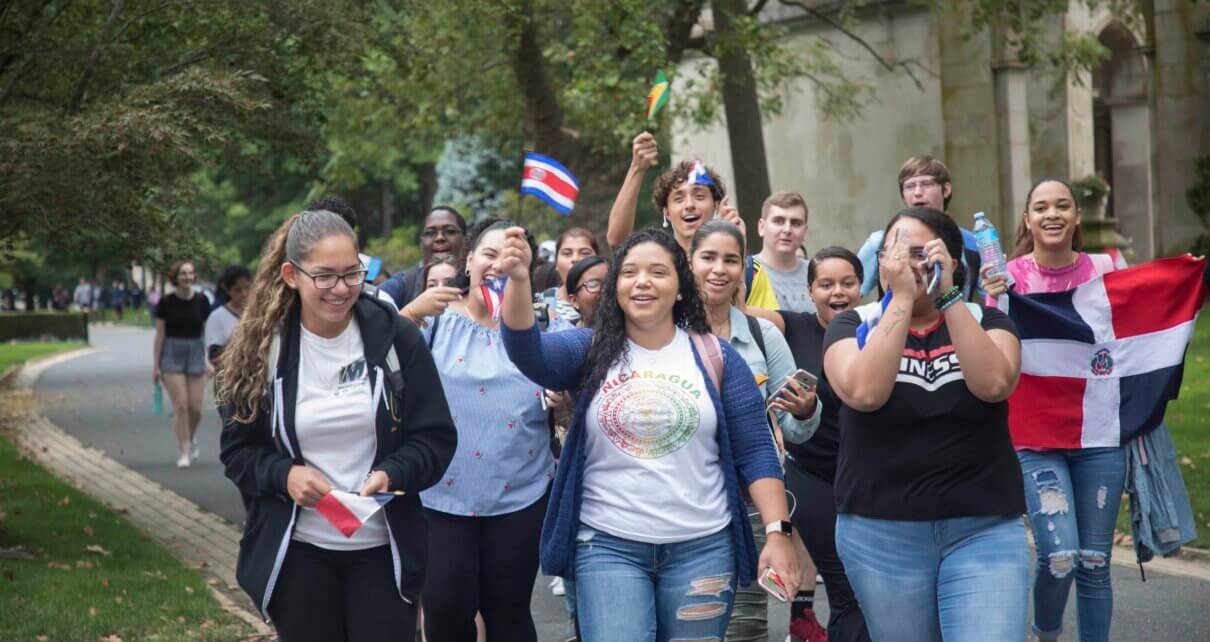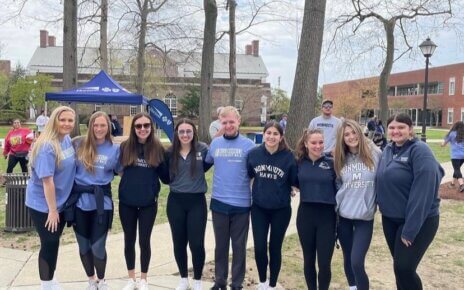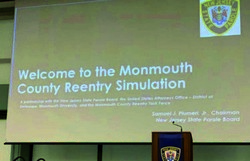Hispanic Heritage Month is celebrated every year starting Sept. 15 until Oct. 15 to recognize the contributions and achievements made by the Latinx community to this country. In 1968, Hispanic Heritage was observed for a week under President Lyndon Johnson; however, it wasn’t until President Ronald Reagan’s term in 1988 when it was extended to cover a 30-day period, and was enacted into law on Aug. 17 of that same year.
Monmouth University joins in on the celebration with various events to help promote the Latinx culture on campus. Some of the events included an outdoor screening of the movie In the Heights, Latinx History Trivia Night, and the featured Keynote given by Dr. Sonia Nieto.
There were many organizations involved in making this month a success, including The Intercultural center, Latina sororities and fraternities, and the Division of Student Life.
One of the many individuals in charge of making this month happen is Zaneta Rago-Craft, Ed.D., the director of the Intercultural Center. The process of putting this month together starts during the summer, when they reach out to student organizations and staff/faculty partners to coordinate events. Rago-Craft said “We generally try to have events finalized and ready to market by the first week of school to give students especially a little bit of time to adjust to their academic schedules.”
However, as we all know this past year has been everything but normal. Last year, all events related to this month were held virtually due to COVID-19, but since the University has returned to in-person classes, so have some of these events. Rago-Craft said, “This year is a mix of virtual and in-person programming. We have had to take into account COVID protocols…and also that many programming spaces around campus that we would normally utilize are being used as classroom spaces.”
Compared to last year, there are significantly less events due to having to adjust back to campus and figuring out how to balance safety protocols, health recommendations, and the best way to present these programs.
Rago-Craft explained, “We wanted to make sure we are providing balanced opportunities, but that dual planning process also meant we had to be extra attentive to details and frequency of events.”
One significant change was the change of the term Hispanic to Latinx after having conversations with students and faculty last year. Rago-Craft said, “We have begun using Latinx Heritage Month to more closely reflect the lived experiences and preferences of many in our community.”
Lambda Theta Alpha Latin Sorority, Incorporated, also known as LTA, hosted an event called “Por La Cultura.” Held during the first week of Latinx Heritage Month, it was created to teach the origins of this month while also promoting awareness of the Hispanic/Latino culture. Some of the main points of this event included the discussion of how communities and cities celebrate the observation of this month, the reason why it begins on Sept. 15, and the difference between Hispanic and Latino.
Destiny Montgomery, a senior history and political science student with a minor in African Diaspora Studies, is the Chapter Vice President and Historian of LTA. She mentioned that some of the challenges included making the slides informative yet fun for students in order to catch their attention.
For Montgomery, there was one specific moment that had stayed with her even after the event was over. She said, “My favorite part is seeing everybody participating in Bachata, whether they knew how to dance or not, they all participated and it was heartfelt.”
Chi Upsilon Sigma National Latin Sorority Inc. organized the event, titled “Immigration and Labor Laws with CUS,” which explored some issues that affect farmworkers, the timeline of agricultural labor in the US in the past and today, child labor laws, and the amount of immigrant workers who work in agriculture are barely protected.
Yarleny Mejia, a senior studying communication with a concentration in public relations, said that the reason behind creating this event was to bring something new to the table. “We wanted to bring all awareness to a topic that not a lot of people know about and we wanted everyone who is going to the event to leave with information they didn’t know when they came in.”
This event was held virtually because of how easy it was to organize via Zoom rather than in person. Mejia explained, “It’s a lot easier to do things on Zoom because people don’t have an excuse not to go… they can just sign in on their phone and have it play on the go.”
While putting this program together, there was one thing that stayed in her mind, which was the pressure of being historically correct. As Mejia mentioned, when she created this program, she came up with the idea and did research, but is not an expert. Mejia added, “Always in the back of my mind for every program is the hope that the information presented is accurate. I never want to appropriate any culture or give misinformation.”
The viewing of In the Heights and the Latinx History Trivia night was co-sponsored by the Office of Student Activities. Tashir Hampton, Assistant Director of Student Activities and Student Center Operations, said that they’ve had a good response from students, adding that, “We always try to encourage as many students to come as possible and bring their friends.”
Emily Loscialpo, a freshman studying Spanish and communication, attended trivia night due to her eagerness to learn more about the culture. “I got some good practice identifying Hispanic countries based on their flags and/or places on the map, plus learned some fun facts that helped me understand all the diverse cultures a little better.”
She mentioned that having the event via Zoom made it more accessible, because she most likely would not have attended if it were in person. Loscialpo added that she liked seeing non-Hispanic people excited to come to the event and learn more about the culture.
The number one concern and challenge when planning these events came down to what events made sense to be held virtually and what could be held in person. Hampton said that they had to be mindful of what spaces were feasible to be used for in-person events to be held safely.
When it comes to Latinx Heritage Month, it’s all about celebrating the differences within us and what makes these Latinx students proud of their roots.
Destiny Montgomery said, “Being Afro-Latina and a history major, Latinx heritage is learning more about this culture…making me even prouder of my Dominican culture.”
For Yarleny Mejia, expressing her Dominican heritage has been difficult. “People usually never know I’m Hispanic because I look like a Caucasian woman, and what a lot of people don’t understand is that I can empathize with them because I’ve had similar struggles.”
Due to these struggles, she has tried to stay informed about issues that the Hispanic community face because of the value it holds for her. Mejia’s parents are immigrants, so she has seen and experienced these struggles first-hand.
She added, “Being able to be a part of Hispanic Heritage Month, it helps me be true to myself, my culture and traditions.”
When this month is over, there are many other ways the Monmouth community can continue to show support to the Latinx community on campus.
Zaneta Rago-Craft, Ed.D., said, “Learn (and teach) Latinx history, engage in Latinx art, support Latinx businesses and take time to learn about the current issues facing Latinx communities.”
Adding to Rago-Craft’s advice, Montgomery also suggests to keep building awareness because the more you know, the more you can be an ally or friend to those in this community.
For both Hampton and Mejia, it also depends on students to continue to elevate Latinx voices on campus.
Hampton said, “If you have ideas for programs, reach out, and if you are looking for support/resources, reach out.”
Mejia commented that although there have been improvements with diversity with the creation of the Intercultural Center, it’s important to reassure Hispanic students and create a support system where they don’t feel judged. However, she also noted that students must also put in the work as well in order to make a difference and be heard.
“At the end of the day if you really want that kind of experience where you feel accepted, you have to work for it. It’s not going to be easy, but be a leader and change the Monmouth community.”




